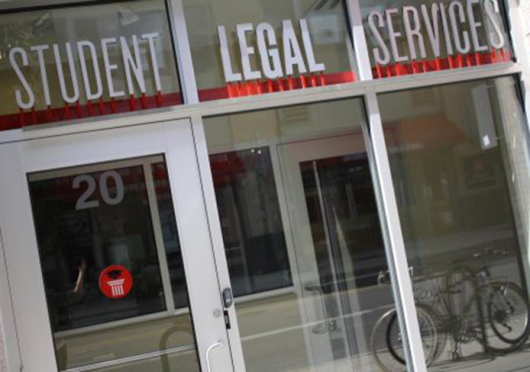
Since its establishment in 2011, Student Legal Services has served more than 11,000 OSU students. Credit: Courtesy of OSU
It took Matthew Tatoczenko and his two roommates a little more than a month to get what they thought was their full security deposit refund on their Worthington Street apartment owned by NorthSteppe Realty.
The tenants were originally supposed to get back $1,250, said Tatoczenko, a fourth-year in computer science and engineering, but they only got $770 back after the landlords said they needed the rest for cleaning fees.
After thinking more about the situation, the roommates decided to contact Student Legal Services to help them file a lawsuit, which they won.
Since its start in 2011, SLS has provided legal services for more than 11,300 students. About 34 percent of those matters involve advice and representation for criminal and traffic offenses, and the remaining 66 percent involve landlord-tenant issues, consumer transactions and debt collection defense, among others, said Molly Hegarty, managing director of the SLS.
The SLS program was originally known as the Student Housing Legal Clinic, where its focus was on landlord and tenant matters, but after a resolution passed by the Board of Trustees in 2010, the scope of the services expanded to providing help for criminal, misdemeanor, consumer transaction and traffic offenses, uncontested domestic matters and document drafting.
Students are required to pay a fee for Student Legal Services, which they can choose to opt out of. It costs $40 for the full year, or $23 if the student is enrolled in the spring and wasn’t in the fall. To enroll for the summer alone, a student would pay $6.
One of the staff attorneys, Alyson Tucker, a former Franklin County Public Defender, said she keeps in mind that students are scared to visit the SLS because they think visiting the office is related to having done something wrong.
“In a lot of our cases (the students) didn’t do anything wrong. I think they’re just afraid of ‘what if someone sees me going in here,’” Tucker said.
The biggest fear students usually have is that their parents will find out about any legal trouble they run into, which is most often underage consumption or possession of alcohol, Tucker said. However, everything between the attorney and the client is confidential and stays between the two, and unless otherwise noted, third parties such as parents can’t become involved, she added.
The more sensitive cases are those that involve stalking and sexual assault, which Tucker said becomes SLS’ top priority when a victim gets in touch with the office.
“We have enough flexibility and enough attorneys here to move things around,” Tucker said. “If you schedule an appointment two days out, I’m going to call you and see if you can come in the same day.”
Although Tucker said they will make every attempt to see clients for any case as soon as possible, the process of how the office goes about the case depends on the comfort level of the victim. First, the office meets with the victim when he or she feels fit. Then they are given advice on how to go about the matter, she added.
“It’s an area we did not expect to have so much representation in, but it’s become one of our most proud areas,” Tucker said of SLS’ handling of sexual assault and stalking cases.
The program works with student organizations, Greek Life and the Student Wellness Center’s Scarlet and Gray Financial Coaching program by holding events and information sessions, Hegarty said.
Hegarty said the SLS is working with the Sexual Violence Education and Support staff (from the Student Wellness Center) to come up with a signature event to raise awareness for Sexual Assault Awareness month in April.
“We do a lot in terms of outreach so that other offices on campus know who we are,” Hegarty said. “So that when they have a student in their office, and vice-versa, we know about each other so that we can refer to each other.”
But SLS’ legal guidance only goes so far. The office cannot represent students with a felony charge. The office instead gives a referral to another firm, as well as guidance regarding what to expect from legal proceedings, Hegarty said.
“They can come in here and start here and get referral resources from us,” she said.
Hegarty said SLS sees a variety of students throughout their college careers for many different reasons.
“We often are the services people don’t need until they need us,” Hegarty said.
Correction: Feb. 20
A previous version of this article said the Board of Trustees passed a resolution in 2011 expanding the scope of services of a program originally known as the Student Housing Legal Clinic. In fact, this resolution was passed in 2010.


